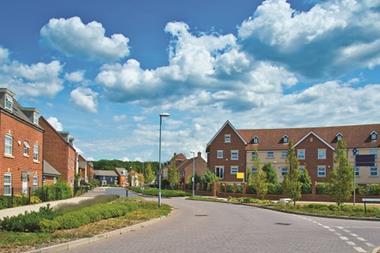The election of Jeremy Corbyn could be an unexpected force for good for UK real estate. We may end up thanking him.

Difficult big issues such as nuclear weapons, NATO and the EU will be parked in the long grass of “policy consultations”. Instead, he will focus on areas where he can unite the Labour party: housing, affordable homes, controlled rents, different tenures, infrastructure, northern growth and Scotland.
Corbyn and his team will be prepared to say the unthinkable and some of their ideas will appeal to core socialists and to a new younger voting class. This will make it easier for the Tories to take the centre ground, as Labour moves further left.
Corbyn will push hard for more council homes or housing association supply, a sure vote winner. To build more affordable housing without straining the public purse means more market housing. This will give the Tories political cover to enact bold ideas to increase the supply of brownfield sites and greenfield land, including a much more liberal planning approach to converting unused offices and industrial land into residential use. Assets and land we never thought possible for housing could potentially become so, with the obvious knock-on benefit for values and liquidity. Communities are better when residential is integrated with offices; we don’t want more ghettos like the City at night.
Other previously unthinkable ideas to improve the quantity and speed of supply could occur with cross-party impetus. Judicial reviews should be stopped for residential planning matters. Local plans must have fixed timeframes. Outline planning applications need to become the standard again, with the detail to follow under reserved matters. This is very effective in Sweden and can significantly reduce upfront costs. Far too many surveys and reports are required in the UK. The country is awash with bats and newts; why waste so much time and money surveying them at specific times of the year?
Simultaneously, Labour will ramp up pressure to use other brownfield land. MP Zac Goldsmith says Transport for London has land amounting to the equivalent of 16 Hyde Parks in the capital. It will become more acceptable, with cross-party support, to build higher, denser developments, allowing smaller or micro apartments.
Before you switch off, thinking residential does not affect you, remember the knock-on economic multiplier effect; the demand for related services of construction, professionals, marketing and others will boost demand for commercial space everywhere. Corbyn will demand more controls over rents and longer duration of rental tenures, another vote winner. The Tories could respond that more rental supply will resolve the issue and that affordable rents should be linked more closely to a percentage of open-market rents, which will level off, or reduce, if supply increases. The Tories may then steal Corbyn’s clothes, by having longer notice periods on assured shorthold tenancies and by enabling Retail Price Index-linked fixed uplifts.
The new Labour leader is also likely to try to win back support in the North and Scotland by pushing for more infrastructure, as he tries to outbid Osborne on the progress of the ‘northern powerhouse’. The cost of HS2 will soar and Corbyn will says it is not worth it; the money should be spent first in the North. The Tories could end up doing both faster, to keep him at bay in the run-up to the 2020 election. National debt will rise, but real estate markets will benefit. With potential cross-party appetite for Crossrail 2, we could see even more major infrastructure spend than currently envisaged, again boosting economic activity. As interest rates remain much lower than expected, so the government could spend its interest-bill savings on infrastructure.
It may be hard to see Corbyn being elected, but his influence on creating more housing and infrastructure could boost economic activity in numerous ways that help our industry.
Richard Tice is chief executive officer of Quidnet Capital (and former chief executive officer of CLS Holdings)





























No comments yet